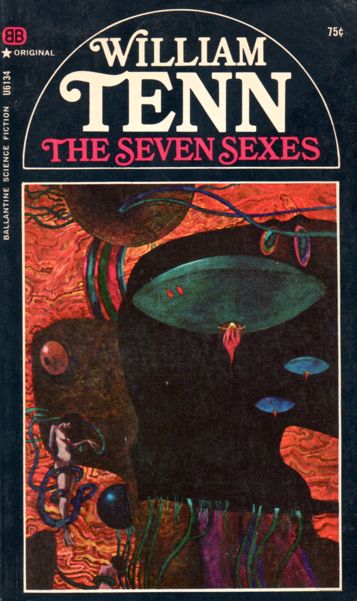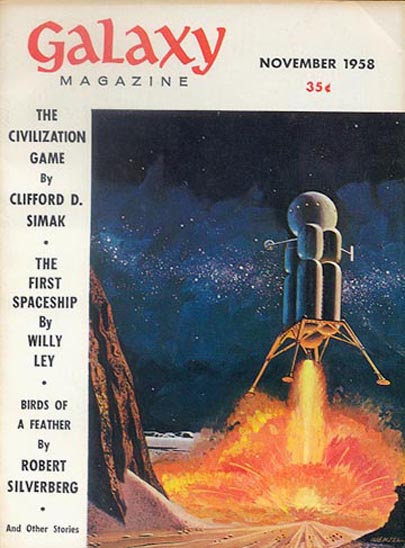"Generation of Noah" ("The Quick and the Bomb,"
Suspense, 1951) -- Grim tale of a farmer with an elaborate fallout shelter who trains his children to get into the shelter within three minutes when the alarm sounds. A taut story which could have been adapted into a
Twilight Zone or
Alfred Hitchcock Presents.
"Brooklyn Project" (
Planet Stories, 1948) -- In a security-obsessed future United States, the demonstration of a time travel device has unexpected consequences. Darker in tone than the other time travel comedies from this author.
"The Dark Star" (
Galaxy, 1957) -- The narrator explains why he
didn't become the first person to land on the Moon. An interesting psychological study.
"Null-P" (
Worlds Beyond, 1951) -- Political satire set in a post-atomic war USA, where an absolutely average man becomes the founder of a dynasty of ruling mediocrity. Sardonic wit abounds.
"Eastward Ho!" (
The Magazine of Fantasy and Science Fiction, 1958) -- Another satiric story of post-apocalypse America, this one set in a future where Native Americans are the ruling class over the few remaining whites. Nicely done, with lots of good details.
"The Deserter" (
Star Science Fiction Stories, 1953) -- A gigantic enemy alien is captured by humans, and the protagonist communicates with it telepathically. A hard-hitting attack on militarism.
"Betelgeuse Bridge" (
Galaxy, 1951) -- Friendly, super-technological aliens arrive on Earth, and offer a life-extension device in exchange for the planet's radioactive elements. A story with multiple ironies.
"'Will You Walk a Little Faster'" (
Marvel Science Fiction, 1951) -- Madcap farce in which gnome-like aliens capture a bunch of people and offer them the ultimate weapon so humanity can destroy itself ahead of schedule. Carries a bite beyond its goofiness.
"It Ends With a Flicker" ("Of All Possible Worlds,"
Galaxy, 1956) -- Yet another "change the present through time travel" yarn, this one involving two different unpleasant futures which keep changing themselves into the other one. Not as silly as some, not as serious as others.
"Lisbon Cubed" (
Galaxy, 1958) -- A guy winds up getting mixed up with all kinds of alien spies disguised as humans, and finds out that Earth is just a very minor part of an extremely complex interstellar war. Darkly comic.
"The Masculinist Revolt" (
The Magazine of Fantasy and Science Fiction, 1965) -- Wild satire of the war between the sexes shows us an androgynous near future where an attempt to return to male domination begins with the return of the codpiece. The author's poison pen spares neither feminists nor male chauvinists.








